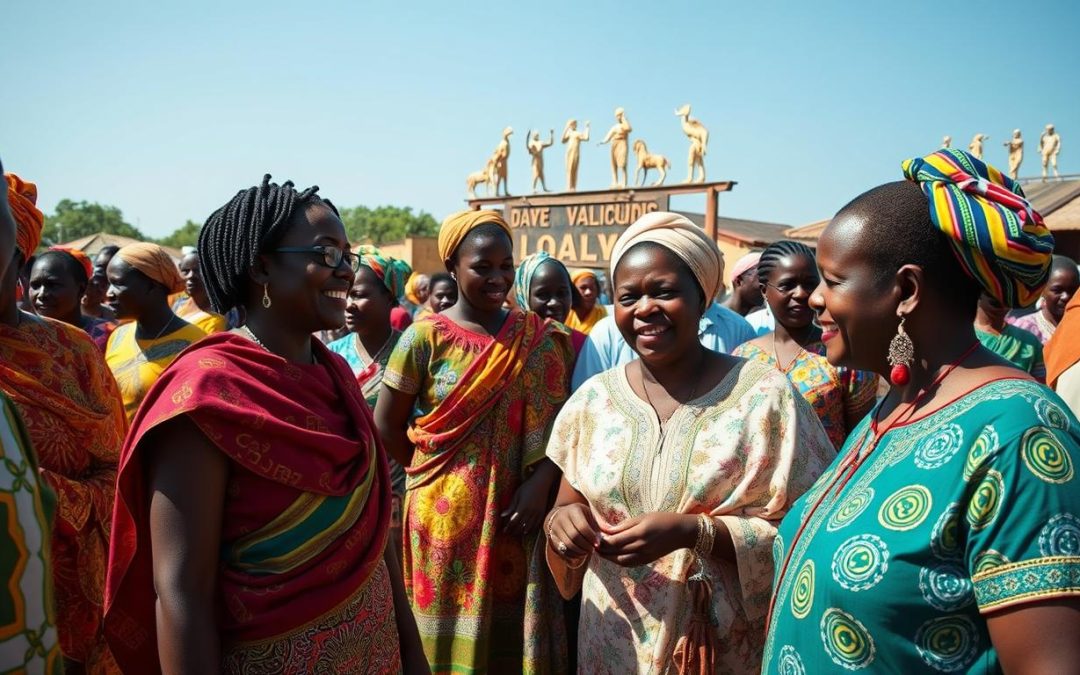Have you ever wondered how a single country can speak over 70 different languages while still feeling united? Ghana’s language scene is a fascinating example of this.
In Ghana, English is the official language. But there are also many indigenous languages that show the country’s rich culture. With over 31 million people, Ghana is a mix of many languages, telling stories of heritage and strength.
Exploring Ghana’s languages, you’ll see that communication is more than just words. English is the official tongue, but languages like Akan, spoken by nearly 50% of the people, keep the culture alive.
Key Takeaways
- Ghana boasts over 70 indigenous languages
- English is the official language of Ghana
- Akan is the most widely spoken indigenous language
- Linguistic diversity reflects Ghana’s complex cultural history
- Urban and rural areas have distinct language usage patterns
The Evolution of Language in Ghana: From Colonial Times to Present
Ghana’s language history is rich and full of cultural change and strength. The story of languages in Ghana shows how history, colonial rule, and national identity mix together.
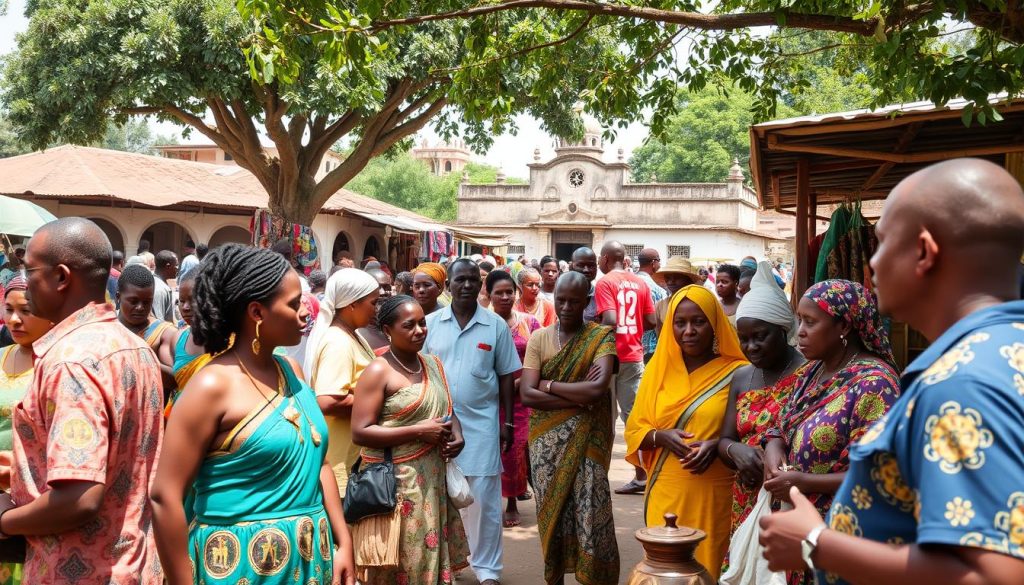
When the British ruled Ghana, they made English the main language for government. This change deeply affected how people talk and work together in Ghana.
British Colonial Linguistic Impact
The colonial time changed Ghana’s language world a lot. English became the key language for:
- Government administration
- Educational institutions
- Legal systems
- Business communications
Post-Independence Language Development
After Ghana became independent in 1957, the government made choices about language. They decided to keep local languages but also use English as the official one.
“Language is the road map of a culture. It tells you where its people come from and where they are going.” – Rita Mae Brown
Modern Language Landscape
Now, Ghana is a lively place with many languages. With about 81 languages spoken, it shows off its rich language diversity.
| Language Category | Percentage of Speakers |
|---|---|
| Akan (including Twi and Fante) | 40% |
| English | Official Language |
| Other Indigenous Languages | 60% |
Learning about Ghana’s language history helps us see how languages grow, change, and show a nation’s complex culture.
English as Ghana’s Official Language: Role and Impact
In Ghana, English is a key tool for communication among different groups. It is the official language, playing a big role in how people interact socially and professionally.
Since Ghana became independent in 1957, English has been its main official language. This choice reflects a complex history and culture that still shapes how people talk to each other.
- Government communications are conducted primarily in English
- Educational institutions use English as the main medium of instruction
- Media broadcasts predominantly occur in English
- Professional sectors require English proficiency
English is more than just a way to talk in Ghana. It opens doors to job opportunities, with knowing English often deciding your career path.
“English is not just a language in Ghana, it’s a key to social mobility and professional success.”
| Language Domain | English Usage |
|---|---|
| Government | Primary Official Language |
| Education | Primary Instruction Medium |
| Media | Dominant Broadcast Language |
| Professional Sectors | Essential Communication Tool |
Even though English is key, Ghana’s many languages are still celebrated. Over 80 local languages live alongside English, making the country’s culture rich and diverse.
For Ghanaians, speaking English and their local languages is a skill and an art. People easily switch between languages based on the situation they’re in.
Major Indigenous Language Families of Ghana
Ghana is home to over 80 languages, spread across many families. This diversity shows the country’s rich cultural heritage and how people communicate.
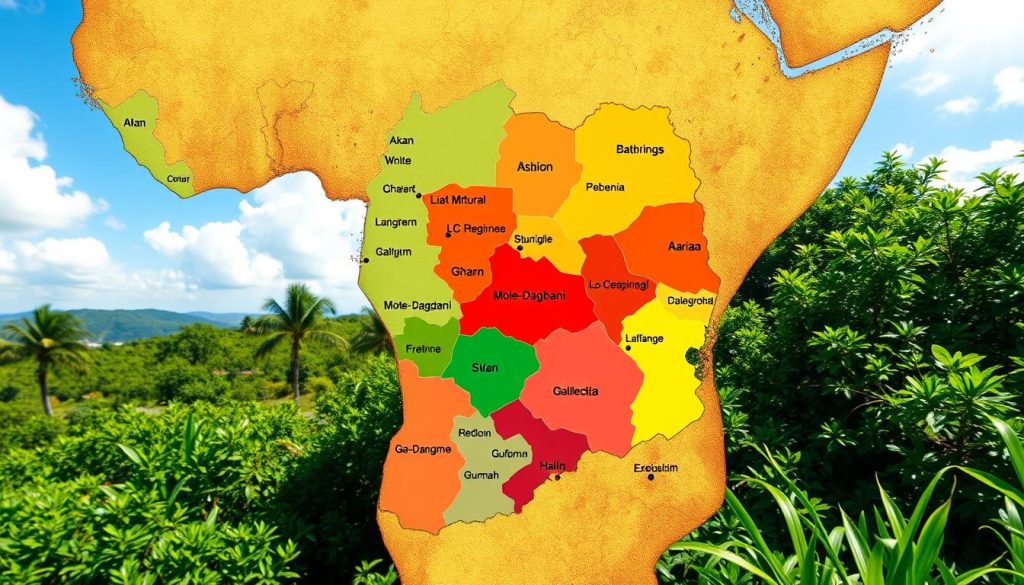
The many ethnic groups in Ghana add to its linguistic variety. About 70 ethnic groups each have their own language.
Niger-Congo Language Family
The Niger-Congo family is the biggest in Ghana. It includes most of the country’s languages, such as:
- Akan languages (most prevalent in southern regions)
- Ewe languages
- Mole-Dagbani languages
- Gur language group
Kwa Language Group
The Kwa group is key in Ghana’s language scene. It includes:
- Akan languages (spoken by about 50% of the population)
- Ga languages
- Adangme languages
Gur and Mande Languages
In northern Ghana, Gur and Mande languages are common. Dagbani, for example, has over three million speakers. It’s a major language in the area.
“Language is the roadmap of a culture. It tells you where its people come from and where they are going.” – Rita Mae Brown
These families highlight Ghana’s language wealth. Each group has its own stories and ways of talking.
Ghana: Official and Widely Spoken Languages
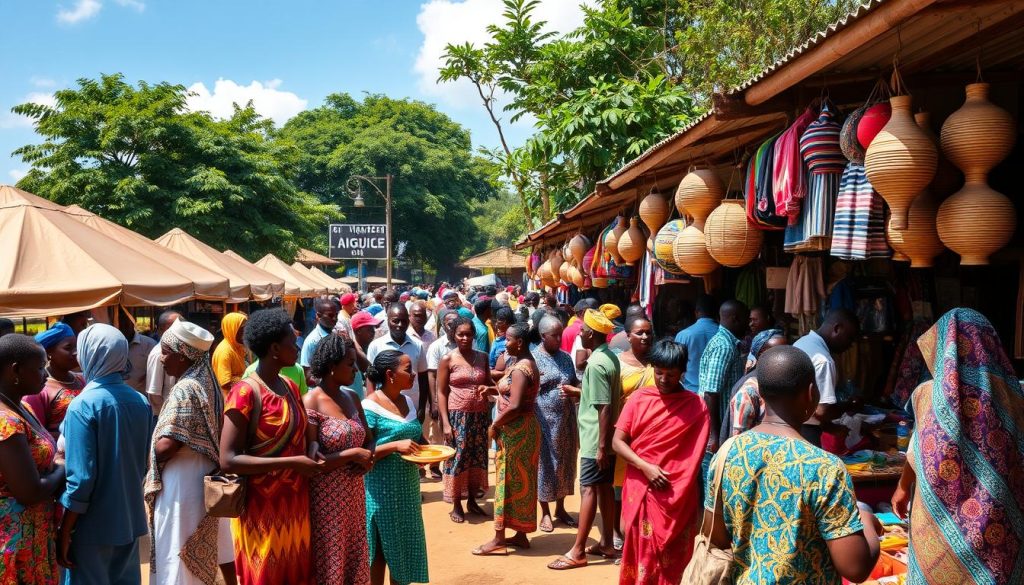
Ghana is home to a rich mix of languages, showing its diverse culture. About 80 languages are spoken here, beyond the official English. This creates a colorful world of communication.
The language scene in Ghana is truly unique. Here are some important facts about its language world:
- Akan is the most spoken indigenous language in southern Ghana
- More than 70 ethnic groups add to the country’s language variety
- The Niger-Congo family makes up over 70% of indigenous languages
Looking at Ghana’s language map, you’ll find interesting numbers. Twi and Fante, Akan dialects, are spoken by over 60% in southern areas. Dagbani, with over 3 million speakers, makes up about 18.5% of the population.
“Language is the road map of a culture. It tells you where its people come from and where they are going.” – Rita Mae Brown
Other key languages include:
- Ewe: Spoken by about 3.8 million people
- Ga: Used by around 600,000 in the Greater Accra region
- Ghanaian Pidgin English: Connecting diverse communities with roughly 5 million speakers
Exploring Ghana’s languages shows how it’s united through communication.
The Akan Language Group: Ghana’s Most Prevalent Languages
The Akan language group is the most spoken indigenous language in Ghana. It has deep roots in the country’s culture. Akan languages connect millions of people across different regions.
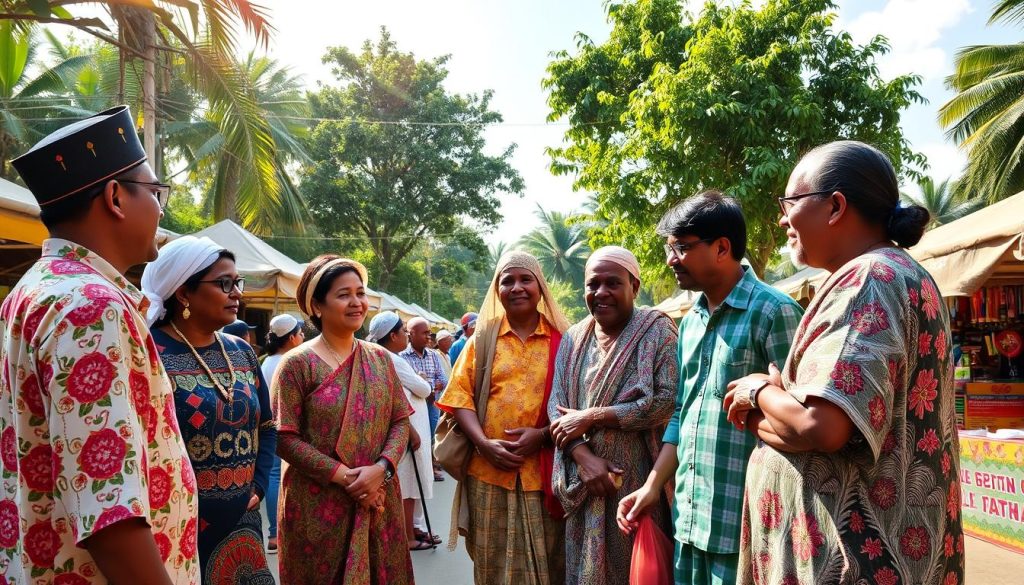
The Akan people are the largest ethnic group in Ghana. Their language has many dialects that show the country’s rich cultural diversity.
Twi and Its Linguistic Variants
Twi is a key dialect in the Akan language family. It has several variations:
- Asante Twi
- Akuapim Twi
- Urban Twi
Fante: Cultural Linguistic Heritage
Fante is another important dialect of Akan, mainly spoken in coastal areas. Its unique language reflects Ghana’s coastal history.
Additional Akan Dialects
There are more Akan dialects beyond Twi and Fante. These include:
- Bono
- Akyem
- Kwahu
“Language is the roadmap of a culture. It tells you where its people come from and where they are going.” – Rita Mae Brown
| Akan Dialect | Primary Region | Approximate Speakers |
|---|---|---|
| Asante Twi | Ashanti Region | 4.5 million |
| Fante | Central Region | 2.5 million |
| Bono | Bono Region | 1 million |
Learning about these languages helps us understand Ghana’s rich culture. It shows the country’s vibrant linguistic diversity.
Regional Languages and Their Distribution
Ghana’s language scene is a colorful mix of many languages. It shows the country’s rich cultural background. With about 80 different languages, Ghana’s linguistic variety is as diverse as its ethnic groups.
The way languages spread across Ghana is interesting. It shows how culture and region are linked. Let’s look at some key areas:
- Volta Region: The Ewe language is common here, showing the strength of one of Ghana’s main ethnic groups
- Greater Accra Region: The Ga-Adangme language is mainly spoken here
- Northern Region: Dagbani and Konkomba languages are common
- Brong-Ahafo Region: People here speak Abron
- Upper West Region: Dagaare is the main language
Knowing about these language areas helps us see how language and culture are connected in Ghana. For example, the Ewe language is not just a way to talk. It also keeps the culture of the Volta Region alive.
“Language is the roadmap of a culture. It tells you where its people come from and where they are going.” – Rita Mae Brown
Ghana’s language map shows how local languages help unite the country. Yet, they also keep regional identities strong. Each language has its own history, traditions, and social details. These add to Ghana’s rich cultural tapestry.
Government-Sponsored Languages and Their Status
Ghana’s language scene is full of cultural variety and a strong push to keep languages alive. The country knows how vital it is to protect its rich language heritage. At the same time, it keeps English as the official language.
The Bureau of Ghana Languages
The Bureau of Ghana Languages is key in helping and growing indigenous languages in Ghana. This government group works on several main goals:
- Documenting and standardizing Ghanaian languages
- Creating educational materials in local languages
- Boosting linguistic diversity and cultural preservation
Educational Policy and Language Use
Ghana’s schools take a multilingual approach, showing off the country’s language variety. The government supports 11 indigenous languages for teaching, letting students learn in their first language early on.
“Language is the roadmap of a culture. It tells you where its people come from and where they are going.” – Rita Mae Brown
Language Preservation Initiatives
The Ghanaian government has set up detailed plans to safeguard and boost its language heritage. These efforts include:
- Creating curriculum materials in indigenous languages
- Backing language documentation projects
- Supporting mother-tongue education in primary schools
- Starting cultural programs to celebrate linguistic diversity
With 81 total languages and 73 indigenous ones, Ghana shows a strong dedication to language diversity. The government’s language efforts are key in keeping cultural identity alive. They also help with education and national unity.
Urban vs. Rural Language Usage Patterns
In Ghana, language use tells a fascinating story of cultural adaptation and preservation. Urban and rural areas show different patterns of language use. These patterns reflect the country’s rich linguistic landscape.
Urban centers like Accra have a dynamic language environment. Code-switching is common here. People switch between English, Hausa, and local languages based on the situation. Research from Madina and West Legon shows this language flexibility.
- English dominates formal settings in urban areas
- Local languages remain primary in home conversations
- Younger generations exhibit greater language versatility
Rural communities focus on preserving indigenous languages. In these areas, languages like Akan dialects hold cultural importance. Linguistic identity remains deeply rooted in traditional communication patterns.
“Language is the roadmap of a culture. It tells you where its people come from and where they are going.” – Rita Mae Brown
Economic factors, education, and urbanization affect language choices. Socioeconomic status influences language preferences. English is often seen as a way to improve social status.
Understanding these language dynamics offers insights into Ghana’s complex culture. Language acts as both a bridge and a cultural marker.
Conclusion
Your journey through Ghana’s languages shows a world full of color and complexity. Over 250 languages are spoken here, making Ghana a true example of linguistic diversity. English is the official language, connecting people, while languages like Akan, Dagbani, and Ewe keep cultural traditions alive.
Ghanaian languages are more than just words. They tell the stories of ethnic groups. Dagbani in the North and Twi in many places show how language brings communities together. Learning these languages gives you a deeper look into Ghana’s social life, from traditional rules to daily talks.
It’s important to keep these languages alive for Ghana’s culture. The government works to protect them, seeing their value in education and keeping culture alive. By valuing all languages, Ghana keeps its rich heritage alive in a world that’s getting smaller.
If you love languages, culture, or just want to learn about Ghana, exploring its languages is a great start. Even a few words in a Ghanaian language can help you understand the culture better and make new friends.
The above is subject to change.
Check back often to TRAVEL.COM for the latest travel tips and deals.
Here are some Tours & Sightseeing suggestions that might pique your interests!
